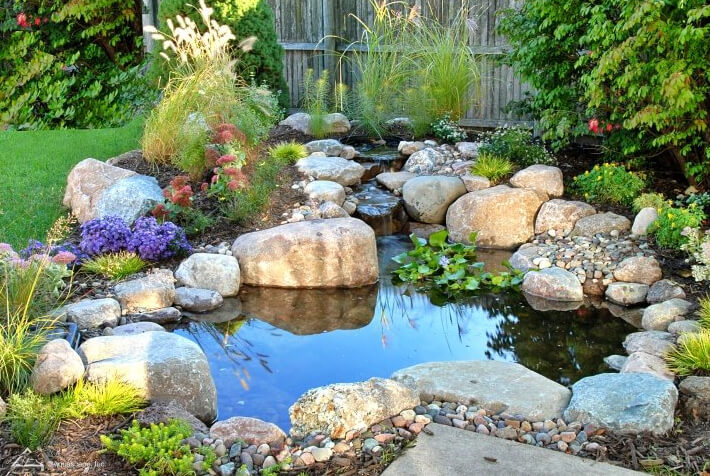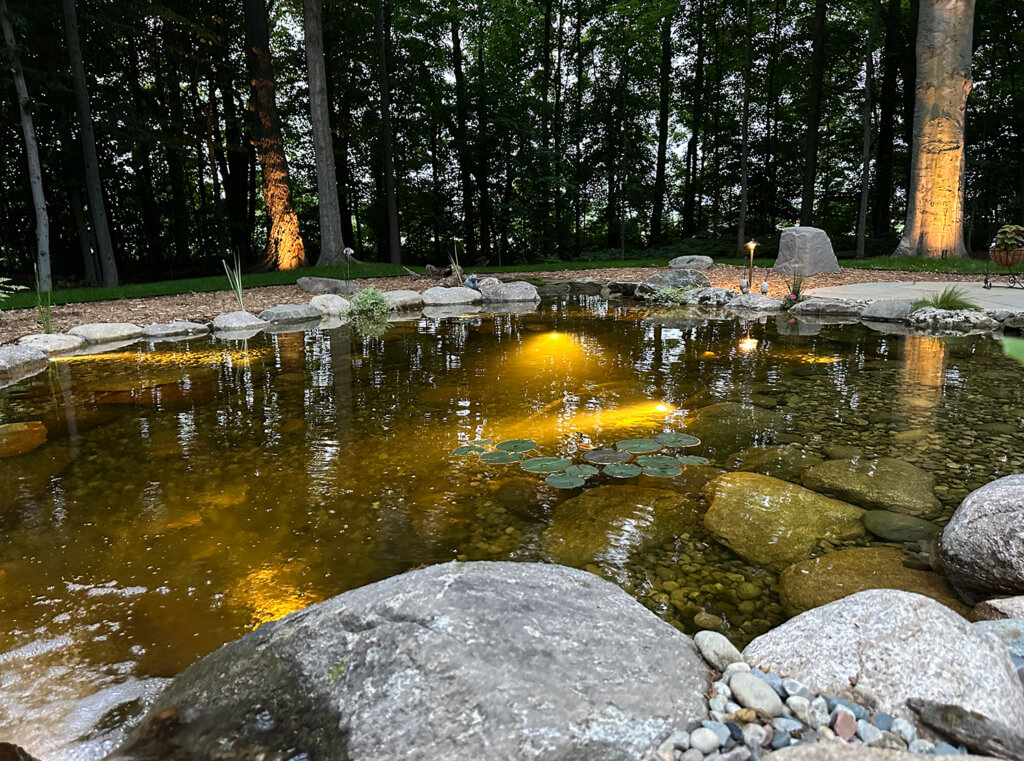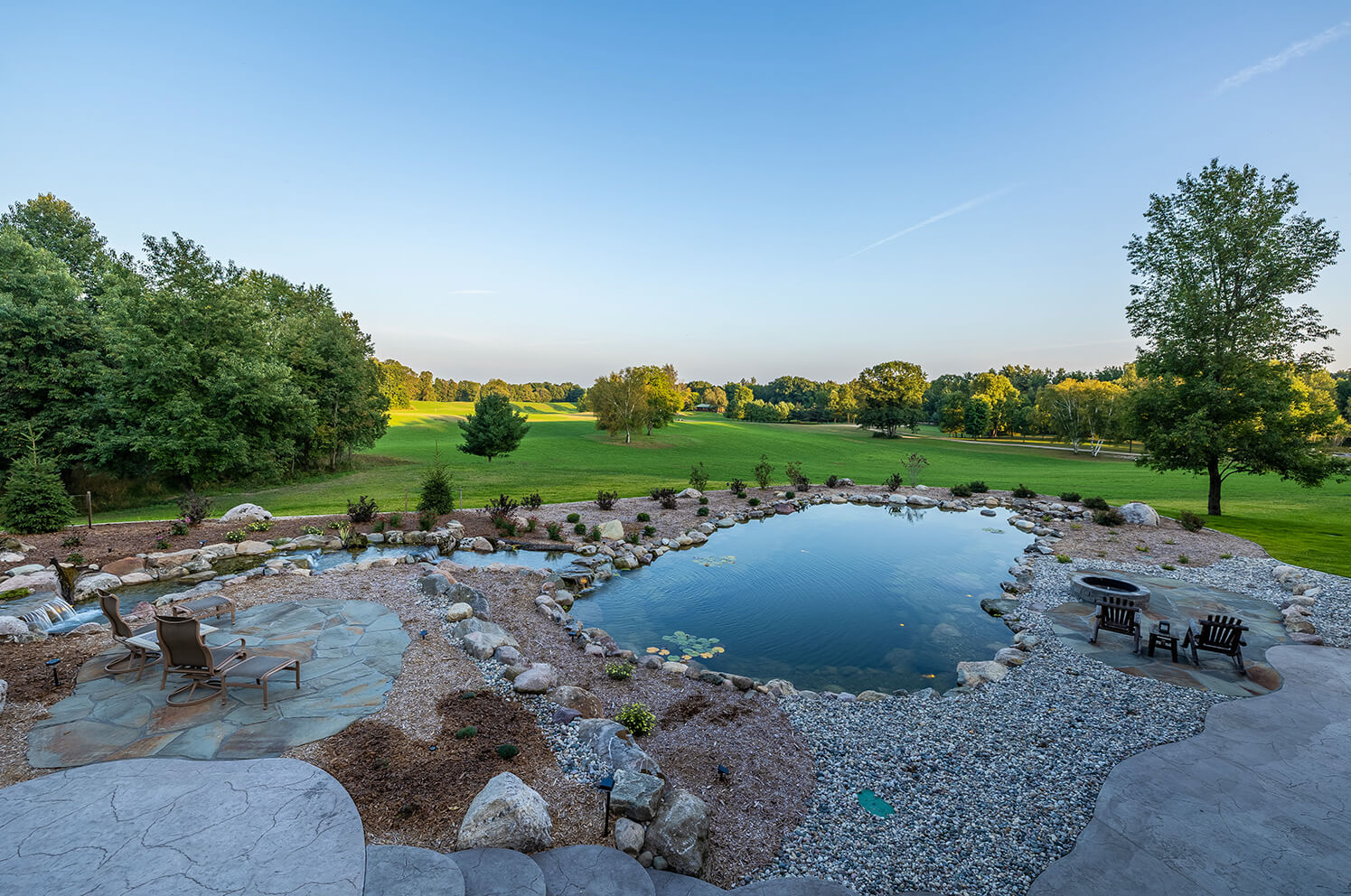For homeowners considering installing a koi pond, here are answers to some commonly asked questions:
Do Ponds Require Lots Of Maintenance?
In reality, a properly installed ecosystem pond is less work than the area of grass it replaces. A balance of five key factors creates the basis for a truly low maintenance pond – filtration, circulation, plants, fish, and rocks and gravel. Will you need to perform a bit of maintenance from time to time? Of course, but you’ll spend less time maintaining a healthy pond than you will mowing, fertilizing, and watering your lawn.
Do Koi Ponds Attract Mosquitoes?
Mosquitoes and other insects are attracted by stagnant water, which they use as a breeding ground. However, koi ponds feature running water so mosquitoes are not a realistic threat. Also keep in mind that ponds support fish, frogs, toads, and other wildlife that are natural predators of mosquitoes.
Can A Koi Pond Solve My Drainage Problems?
People often assume the best placement is in the lowest part of their backyard. While this may make sense aesthetically, the koi pond will actually function better on higher ground. When the pond sits in the lowest part of a yard, run-off is more likely to accumulate in it — which could potentially cause harm to the fish it contains.
Can A Pond Be Installed Near Trees?
Many homeowners believe that trees and koi ponds do not get along since the tree’s leaves will accumulate in the pond during the fall. While this is true, on the flipside, those same trees will provide shade that can minimize an algal bloom in the summer. Plus, if you have a properly sized skimmer installed in your pond, it will easily pull most of the leaves and other tree-related debris off the top of the pond.

Will Rocks And Gravel Make The Pond Hard To Clean?
Actually, having rocks and gravel at the bottom of a pond gives aerobic bacteria a natural place to colonize. This bacteria is good — it breaks down the fish waste and debris that might otherwise accumulate and become sludge. Ultimately, rocks and gravel tend to enhance the health and aesthetics of the pond.
How Deep Does A Koi Pond Need To Be?
Pond fish, including koi, go dormant in ponds. A minimum depth of 2-feet is recommended, even in Michigan’s cold climate. A small circulating in-pond pump and pond de-Icer are all you need to keep a hole in the ice for the exchange of gasses.
Can I Have Plants In A Koi Pond?
Homeowners are often surprised to find out that koi and plants complement each other and have a naturally symbiotic relationship given they have a balanced population. The fish feed on the plants, create waste that’s broken down by aerobic bacteria on the bottom of the pond and is in turn used to fertilize the plants.
Is Algae Good For My Pond?
A small amount of algae is considered beneficial and an integral part of a healthy ecosystem. Pristine, over-treated water isn’t natural, nor is it good for your fish who enjoy snacking on algae that cling to rocks. An abundance of algae has a simple cause – too much sunlight and plenty of nutrient-rich water. That’s why a well-designed pond includes proper filtration to diminish the nutrients that contribute to the growth of algae. In addition, aquatic plants compete for the same food source as algae and can help control its growth.
Are Koi An Easy Target For Predators?
Normal backyard visitors eating koi fish straight from the pond happens far less than one might think. Small mammals like raccoons won’t swim, and larger mammals like wolves likely won’t take the plunge into the pond when they see the koi swimming deeper to avoid them. Some birds might pose a threat, but with the inclusion of a little cave-like structure at the bottom of the pond and plenty of lily pads at the top, your koi will be safe.

Will Having A Pond Decrease The Value Of My Home?
Having a traditional swimming pool can be a problem when it comes to resale value of a home due to the maintenance it requires for potential buyers. Sometimes, homeowners assume the same thing is true about koi ponds. However, real estate agents will generally say that koi ponds raise the value of a home, especially as the popularity of natural water features is on the rise.

